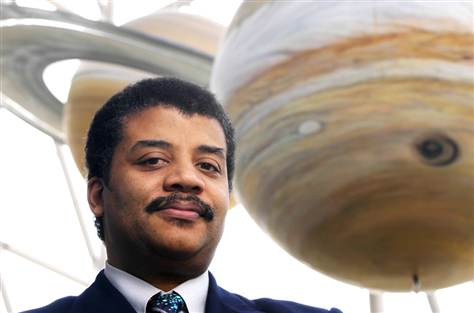http://www.openculture.com/2011/12/neil_degrasse_tyson_8_books_every_intelligent_person_should_read.htmlNeil deGrasse Tyson Lists 8 (Free) Books Every Intelligent Person Should Read
A Reddit.com user posed the question to Neil deGrasse Tyson: “Which books should be read by every single intelligent person on the planet?”
Below, you will find the book list offered up by the astrophysicist, director of the Hayden Planetarium, and popularizer of science. Where possible, we have included links to free versions of the books, all taken from our Free Audio Books and Free eBooks collections. Or you can always download a professionally-narrated book for free from Audible.com. Details here.
If you’re looking for a more extensive list of essential works, don’t miss The Harvard Classics, a 51 volume series that you can now download online.
1.) The Bible (eBook) - “to learn that it’s easier to be told by others what to think and believe than it is to think for yourself.”
2.) The System of the World by Isaac Newton (eBook) – “to learn that the universe is a knowable place.”
3.) On the Origin of Species by Charles Darwin (eBook – Audio Book) - “to learn of our kinship with all other life on Earth.”
4.) Gulliver’s Travels by Jonathan Swift (eBook – Audio Book) – “to learn, among other satirical lessons, that most of the time humans are Yahoos.”
5.) The Age of Reason by Thomas Paine (eBook – Audio Book) – “to learn how the power of rational thought is the primary source of freedom in the world.”
6.) The Wealth of Nations by Adam Smith (eBook – Audio Book) - “to learn that capitalism is an economy of greed, a force of nature unto itself.”
7.) The Art of War by Sun Tsu (eBook – Audio Book) - “to learn that the act of killing fellow humans can be raised to an art.”
8.) The Prince by Machiavelli (eBook – Audio Book) - “to learn that people not in power will do all they can to acquire it, and people in power will do all they can to keep it.”
Tyson concludes by saying: “If you read all of the above works you will glean profound insight into most of what has driven the history of the western world.”
He has also added some more thoughts in the comments section below, saying:
Related Content:
Stephen Colbert Talks Science with Astrophysicist Neil deGrasse Tyson
50 Famous Academics & Scientists Talk About God
Neil deGrasse Tyson Stars in New Symphony of Science
The Harvard Classics: A Free Digital Collection
450 Free Courses Online
Below, you will find the book list offered up by the astrophysicist, director of the Hayden Planetarium, and popularizer of science. Where possible, we have included links to free versions of the books, all taken from our Free Audio Books and Free eBooks collections. Or you can always download a professionally-narrated book for free from Audible.com. Details here.
If you’re looking for a more extensive list of essential works, don’t miss The Harvard Classics, a 51 volume series that you can now download online.
1.) The Bible (eBook) - “to learn that it’s easier to be told by others what to think and believe than it is to think for yourself.”
2.) The System of the World by Isaac Newton (eBook) – “to learn that the universe is a knowable place.”
3.) On the Origin of Species by Charles Darwin (eBook – Audio Book) - “to learn of our kinship with all other life on Earth.”
4.) Gulliver’s Travels by Jonathan Swift (eBook – Audio Book) – “to learn, among other satirical lessons, that most of the time humans are Yahoos.”
5.) The Age of Reason by Thomas Paine (eBook – Audio Book) – “to learn how the power of rational thought is the primary source of freedom in the world.”
6.) The Wealth of Nations by Adam Smith (eBook – Audio Book) - “to learn that capitalism is an economy of greed, a force of nature unto itself.”
7.) The Art of War by Sun Tsu (eBook – Audio Book) - “to learn that the act of killing fellow humans can be raised to an art.”
8.) The Prince by Machiavelli (eBook – Audio Book) - “to learn that people not in power will do all they can to acquire it, and people in power will do all they can to keep it.”
Tyson concludes by saying: “If you read all of the above works you will glean profound insight into most of what has driven the history of the western world.”
He has also added some more thoughts in the comments section below, saying:
Thanks for this ongoing interest in my book suggestions. From some of your reflections, it looks like the intent of the list was not as clear as I thought. The one-line comment after each book is not a review but a statement about how the book’s content influenced the behavior of people who shaped the western world. So, for example, it does no good to say what the Bible “really” meant, if its actual influence on human behavior is something else. Again, thanks for your collective interest. -NDTysonH/T goes to Galley Cat
Related Content:
Stephen Colbert Talks Science with Astrophysicist Neil deGrasse Tyson
50 Famous Academics & Scientists Talk About God
Neil deGrasse Tyson Stars in New Symphony of Science
The Harvard Classics: A Free Digital Collection
450 Free Courses Online


No comments:
Post a Comment